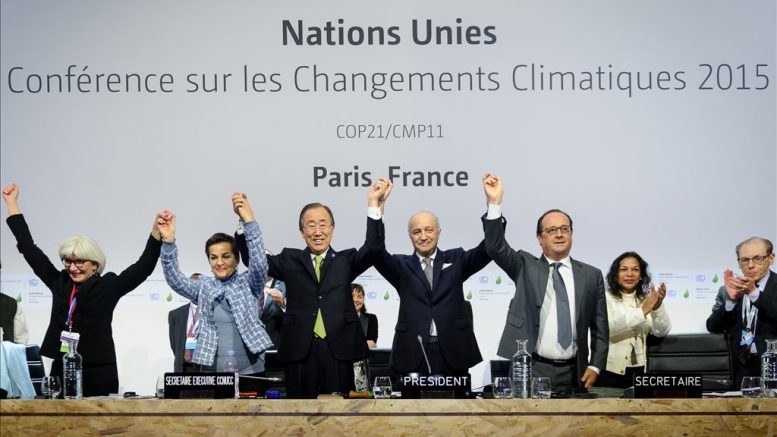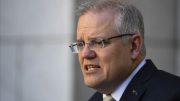With the Trump presidency turning its back on the complexities of climate change, China flags it is ready to take the lead, Geoff Kitney writes
Key figures in the international coalition working to prevent any retreat from the Paris commitments to combat climate change are increasingly looking to the French presidential election for hope of sustaining the pace of global climate action.
Amid deep concern that dramatic changes to the political landscape in the United States and in the United Kingdom have increased the risks that the forces of climate change scepticism may be gaining traction, the possibility that the French election might break the momentum of rising right-wing populism is offering some comfort.
With the latest opinion polls in France pointing to the possibility of a centrist, pro-European victory – and, with it, the prospect of France invigorating the fight for progressive policies, including climate action – there is a growing feeling in the climate change movement that Europe could be a counter-balance to rising climate scepticism in the US and elsewhere.
In Brussels the hope for the future of international climate action is strong EU leadership in partnership with China
Officials involved in advancing the Paris agreement on climate change say that it will be critical to the fate of the agreement that any US-led retreat must be met with a strong international response.
They say that Europe will have to lead that response but that a victory for the conservative right, or the far right, in France would be likely to weaken Europe’s political clout.
A senior Brussels-based diplomat (who declined to be named) told Chief-Exec.com that there was deep consternation among those working on implementing the Paris agreement about the apparent “lease of life” that Donald Trump’s presidency had given to the forces which want to smash the Paris deal.
He said that it was already apparent that Trump’s rise in the US was giving encouragement to “denialists” around the world.
This was not just encouraging those with hardline views against the existence of human-caused climate change, but there was a danger it would provide an excuse for governments to slow down or stall on implementing potentially painful policy changes for dealing with climate change.
He cited the British government and the fact that Prime Minister Theresa May appeared to have pushed climate change action well down her priority list.
“The Brexit process is going to impose a massive burden on the British government’s policy making processes,” he said. “Dealing with complex political issues such as climate change is going to be much harder because of this.”
Of particular concern to those responsible for implementing the Paris agreement is that the uncertainty that the Trump presidency has created will make it harder for business to make its own decisions about how climate change policy is likely to affect them.
One of the key factors driving the Paris process was the need to set a framework in which governments could take action on climate change that would allow businesses to do long-term planning. Investment in renewable technologies as well as restructuring business models to cope with a global move away from fossil fuels are critical to achieving the Paris agreement target of stabilising global temperatures to “well below” a 2 degree rise compared to pre-industrial levels.
For a real-life example of how corporate decision makers can be confused by the political decision making process, policy makers only need to look at Australia: Australian climate change policy has swung wildly over the past six years as climate change advocates and denialists have traded the political ascendency.
In 2010, Australia was a world leader in climate change action, introducing a carbon tax (with a generous compensation package for low and middle-income earners) and setting clear goals for the transition to renewable energy sources.
After a change of government from the centre-left to the centre-right in 2013 (with a leader who said climate science was “crap”) the carbon tax was ditched and incentives for renewables were slashed.
The current centre-right government says it accepts the science of climate change but rejects carbon pricing as a policy lever.
It is committed to a Paris-agreement target of reducing Australian emissions by 26 per cent to 28 per cent compared to 2005 levels, but the latest data shows Australian emissions (already the highest per capita in the developed world) are rising.
The government now says it believes technology is the answer to climate change and has backed “clean coal” – that is using carbon capture and storage technology and so-called “supercritical” and “hypercritical” coal-fired electricity plants.
At the end of last week, as south eastern Australia baked in record heat, Professor Clive Hamilton, a senior member of the Australian Climate Change Authority – the government’s independent adviser of climate policy – resigned, saying that the Australian Government had abandoned any pretence of taking climate change seriously.
The government’s economy minister this week took a lump of coal into parliament to demonstrate the government’s commitment to “this beautiful black rock”.
This comes as the European Union (EU) has been advised (by Climate Analytics, a Berlin-based climate institute) that all European coal-fired power stations will have to shut down by 2030 if it is to meet its Paris target of a 40 per cent reduction on 1990 emission levels.
European Union officials now say Australia is a very poor model for climate change policy. But Australian officials retort that the EU is facing its own problems with coal – especially as Poland (whose coal-fired power stations, together with Germany’s, account for more than half of the EU’s emissions) appears to be encouraged by what is happening in the US to fight to continue using coal-powered electricity plants.
The EU officials concede that this would be a much bigger problem if there was a right-wing victory in France and if this led to any backtracking on climate policy.
I have a message for you guys. #ScienceMarch pic.twitter.com/ZnkFIIksdx
— Emmanuel Macron (@EmmanuelMacron) February 10, 2017
They are putting their hopes on presidential candidate Emmanuel Macron, who this week said that, if he won the presidency, he would invite America’s climate scientists to migrate to France.
In Brussels the hope for the future of international climate action is strong EU leadership in partnership with China, which has indicated a desire to be the global leader on climate change in the event that the US relinquishes the role.





